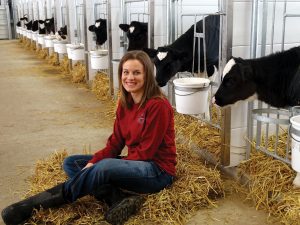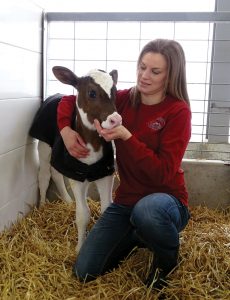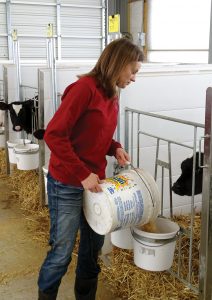 Young farmer, leader, runner charts her own course
Young farmer, leader, runner charts her own course
Andrea Brossard is a runner, literally and figuratively. When she’s not running a third-generation dairy farm with her family, she runs full and half marathons. The energetic 33-year-old also leads the pack as 2015’s chair of the Wisconsin Farm Bureau’s Young Farmer and Agriculturist Committee.
“Being your own boss allows you to work your passion, invest in a lifestyle and build a legacy for future generations,” she said of being a dairy farmer. “It’s more than a job. You put all of yourself into it.”
“I was a typical farm kid in 4-H and FFA and showing cattle, so I always wanted to be in agriculture,” she said. “My parents (Dennis and Carol Brossard) have always been supportive of me farming someday. That door has always been open.”
When Andrea graduated from Beaver Dam High School in 2000, her parents included her as an owner of a limited liability corporation for the farm.
“This has always been a family business, and that’s how they wanted it to continue,” Brossard said.
While returning to Dodge County to farm has always been in the cards, Andrea’s career path would take her away from the farm for a time.
 After high school, like her brother, she enrolled in the University of Wisconsin-Madison’s Farm and Industry Short Course. That year-long training for future farmers evolved into graduating from UW-Madison with bachelor’s degrees in dairy science and agricultural journalism in 2005.
After high school, like her brother, she enrolled in the University of Wisconsin-Madison’s Farm and Industry Short Course. That year-long training for future farmers evolved into graduating from UW-Madison with bachelor’s degrees in dairy science and agricultural journalism in 2005.
For the next two years she worked for Agri-Nutrition Consulting as a dairy nutritionist working with dairy farms in Wisconsin, California and Pennsylvania. From there she went to the Wisconsin Milk Marketing Board, creating newsletters and crisscrossing the state at trade shows and the Wisconsin State Fair as a producer communications specialist. Next was a stint as the Director of Communications for East Central Select Sires, a cattle breeding business in Waupun.
“There was a time I wasn’t sure how long I’d stay in the industry side of agriculture before coming back to farming full-time,” said Brossard who worked double duty (a day job and mornings, nights and weekends on the farm) after her father suffered a stroke in 2008, impairing his physical involvement with the farm. With her parents now in their seventies, the decision was made last summer that Andrea would return to the farm full-time.
 Her responsibilities include calf care, monitoring herd health issues, managing the farm’s employees, book-work and keeping abreast of the technological side of a modern dairy farm.
Her responsibilities include calf care, monitoring herd health issues, managing the farm’s employees, book-work and keeping abreast of the technological side of a modern dairy farm.
“One of the things I love is working outside” Brossard said. “I worked for some great organizations and miss many of my colleagues, but I struggled with being cooped up in an office.”
The Brossards’ neat and tidy farm consists of 650 acres of land used to grow crops to feed the 200-cow milking herd. In 2001, a milking parlor and freestall barn were built to replace an aging 48-stanchion barn.
The farm’s roots trace back to when Andrea’s maternal grandfather, Walter Werner, began dairy farming about a century ago in Dodge County’s Town of Trenton. Andrea’s mother, Carol, was one of the Werners’ two daughters.
“My grandfather and parents built a well-run farm that was a huge opportunity to come back to,” she said. Brossard says there are many opportunities that exist in agriculture for those not born into farm families. She’s seen it happen firsthand with her farm’s part-time employees and as a guest instructor at the UW-Madison’s Farm and Industry Short Course.
“Most employers like to see farm experience on a resume. It means you’ve experienced hard work and early or long hours,” she said.
Personally, going from being an employee to managing and motivating the farm’s employees was a rewarding transition for Brossard.
“I’ve learned a lot of people skills. We treat our employees like part of the family. They watch how my brother and I care for our animals and then carry it out themselves,” she said.
Brossard also has grown from her involvement in Farm Bureau.
While working in Madison, she saw it as a way to get reacquainted with Dodge County’s agricultural scene. She soon chaired Dodge County Farm Bureau’s Young Farmer and Agriculturist Committee and sparked change in the county Farm Bureau’s leadership as its first female board director. Today she serves as its secretary/treasurer and coordinates popular events like a fish fry in Juneau that attracts more than 500 people, and the Dodge Dash, a 5K run-walk that takes place at the Brossard Farm.
She says Farm Bureau’s Institute leadership class propelled her involvement on the state level. She won the Excellence in Agriculture competition (for Young Farmer and Agriculturist members working off of the farm) in 2009. More than once she’s been a state finalist in Farm Bureau’s Discussion Meet.
 When interviewed for this story in April, Brossard was training for a duathlon (a 3-mile run, followed by a 20-mile bike ride and another two mile run). She brings the same kind of driving enthusiasm to farming and promoting agriculture.
When interviewed for this story in April, Brossard was training for a duathlon (a 3-mile run, followed by a 20-mile bike ride and another two mile run). She brings the same kind of driving enthusiasm to farming and promoting agriculture.
She proudly gave a tour of a calf barn that was completed last fall. With room for 72 calves, tunnel ventilation with curtain side-walls give the structure a light and airy feel.
“They excel in this setting. We pasteurize the milk we feed them. Calf care is one of the most important parts of a dairy,” she said. “Our goal isn’t to be a 1,000 cow herd. Instead, we focus on production and strive to provide the type of great animal care that makes a good herd.”
This attention to detail is on display at the many farm tours they host.
“Today’s consumer wants to know where their food comes from. I get that. So being more proactive and transparent is important,” she said.
Grocers and chefs from across the nation are often brought to the farm by the Wisconsin Milk Marketing Board.
“Sometimes because our cattle aren’t out on pasture, they assume they aren’t being taken care of, but they leave amazed at how meticulous things can be on a farm,” she said. “The biggest thing my brother and I take away from those tours is how hungry they are for information. They come here not knowing what went into the products they serve. Nor do they know any young people like us who are in this line of work. It really strikes me when they say how much they respect what we do and how it’s done.”
Story by Casey Langan. Original version appeared in the June|July 2015 issue of Wisconsin Farm Bureau Federation’s Rural Route.


Leave a Reply